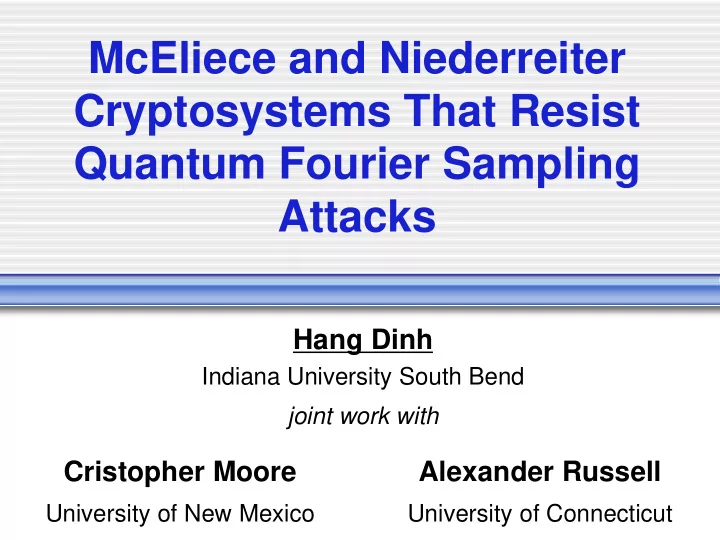

McEliece and Niederreiter Cryptosystems That Resist Quantum Fourier Sampling Attacks Hang Dinh Indiana University South Bend joint work with Cristopher Moore Alexander Russell University of New Mexico University of Connecticut
Post-quantum cryptography • Shor’s quantum algorithms for Factoring and Discrete Logarithm break RSA, ElGamal, elliptic curve cryptography... • Are there “ post-quantum ” cryptosystems? cryptosystems we can carry out with classical computers [unlike quantum cryptosystems, which require quantum facility] which will remain secure even if and when quantum computers are built . Hang Dinh - IU South Bend
Post-quantum cryptography • Candidates for post-quantum cryptosystems: lattice-based code-based (the McEliece system and its relatives) hash-based multivariate secret-key cryptography • Bernstein, 2009: These systems are believed to resist quantum computers. “ Nobody has figured out a way to apply Shor’s algorithm to any of these systems. ” Hang Dinh - IU South Bend
We show that some McEliece and Niederreiter cryptosystems resist the natural analog of Shor’s quantum attack. Hang Dinh - IU South Bend
How Shor’s algorithm works Breaking RSA Breaking ElGamal, elliptic private key curve cryptography Integer Factorization Discrete Logarithm Hidden Subgroup Problem Hidden Subgroup Problem over a cyclic group Z N over an abelian group Z N × Z N Quantum Fourier Sampling Quantum Fourier Sampling over Z N over Z N × Z N Hang Dinh - IU South Bend
Hidden Subgroup Problem (HSP) • HSP over a finite group G : Input: function f : G { , , …} that distinguishes the left cosets of an unknown subgroup H <G … H g 2 H g 3 H g k H Output: H • Notable reductions to nonabelian HSP: Unique Shortest Vector Problem HSP over D n [Regev’04] Graph Isomorphism HSP over S n with | H |≤2 Hang Dinh - IU South Bend
Quantum Fourier Sampling (QFS) QFS over G to find hidden subgroup H : Uniform superposition over G uniform Use input function f superposition over coset gH random coset state gH Quantum Fourier transform ρ weak Measure ij , i , j gH strong ρ ρ column j , i , j block matrix corresponding to irreducible representation ρ of G
McEliece/Niederreiter Cryptosystems • Scramble M’s rows Permute M’s columns Hang Dinh - IU South Bend
McEliece/Niederreiter Cryptosystems McEliece system Niederreiter system • F 𝑟 F 𝑟 𝑚 𝑚 ≥ 1 • F 𝑟 = F 𝑟 𝑚 𝑚 = 1 • M is a generator matrix of • M is a parity check matrix of an 𝑜, 𝑙 -code over F q . an 𝑜, 𝑙′ -code C over F q . Equivalent to the McEliece • Equivalent to the McEliece system using C , if system using C , if 𝑙 ′ = 𝑜 − 𝑚𝑙 . dim 𝐷 = 𝑜 − 𝑚𝑙 . • Originally used classical • Originally used rational Goppa codes (GRS codes) binary Goppa codes ( q =2 ) Hang Dinh - IU South Bend
Security of McEliece and Niederreiter Systems • Two basic types of attacks Decoding attacks [previous talk] Attacks on private key [this talk] Recover S, M, P from M* • Security against known classical attacks Still secure if using classical Goppa codes [EOS’07] Broken if using rational Goppa codes ( Ouch !) Sidelnokov & Shestakov’s attack factors SMP into S and MP . Hang Dinh - IU South Bend
McEliece/Niederreiter’s security reduces to HSP Scrambler-Permutation Problem Given: M and M* = SMP for some (S, P) GL k (F q ) × S n Find: S and P ~ Can this HSP be solved by strong QFS? Hang Dinh - IU South Bend
Our Answer (1) • Strong QFS yields negligible information about hidden (S, P) if M is good , meaning M has column rank 𝑠 ≥ 𝑙 − 𝑝 𝑜 /𝑚 , ≤ 𝑓 𝑝 𝑜 , and 𝐵𝑣𝑢 𝑁 Minimal degree of Aut ( M ) is (𝑜) . the minimal number of points moved by a non-identity permutation in Aut (M) • Next question: Are there matrices M satisfying the conditions above? Hang Dinh - IU South Bend
Our Answer (2) • GL F , S v v v k l q 1 2 n F { 0 }, v v v v l i 1 1 2 2 n n q M S F { }, i l q 1 1 1 k k k v v v ' s are distinct. 1 1 2 2 n n i Hang Dinh - IU South Bend
Conclusion • The following cryptosystems resist the natural analog of Shor’s QFS attack: McEliece systems using rational Goppa codes Niederreiter systems using classical Goppa codes. In general, any McEliece/Niederreiter system using linear codes with good generator/parity check matrices. Warning: This neither rules out other quantum (or classical) attacks nor violates a natural hardness assumption. Hang Dinh - IU South Bend
Conclusion (Moral) need new Quantum ideas Fourier Sampling RSA ElGamal Niederreiter McEliece Hang Dinh - IU South Bend
Open Questions • What are other linear codes that possess good generator/parity check matrices ? • Can these cryptosystems resist stronger quantum attacks, e.g., multiple-register QFS attacks? Hallgren et al., 2006: subgroups of order 2 require highly-entangled measurements of many coset states. Does this hold for subgroups of order > 2? Hang Dinh - IU South Bend
Questions? • Thank you all for staying till the last minute! Hang Dinh - IU South Bend
Parameters • In case of Niederreiter systems using a classical q -ary Goppa code C , we need 2 0 . 2 3 k n l o n and e q n q • Typically, 𝑜 = 𝑟 𝑚 , then we only need 𝑙 2 ≤ 0.2𝑜𝑚, which implies C must have large dimension: 3 / 2 dim 0 . 2 C n kl n n l Hang Dinh - IU South Bend
Recommend
More recommend